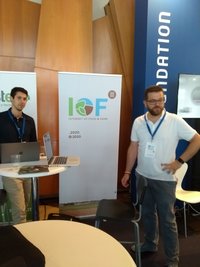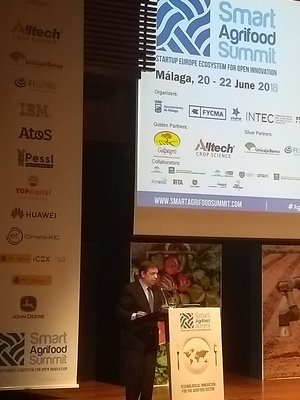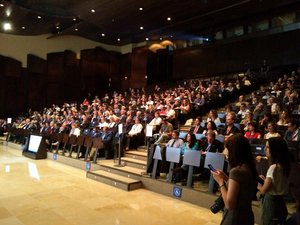With support from Startup Europe, the city municipality, the Andalusian government as well as private sponsorships, Malaga held an important event treating digital revolution on agriculture between 21 and 22 June. The new Spanish Minister of Agriculture, Luis Planas, who presides this event, expressed his ambition to put digitization high on his agenda during the introductory session. 
IoT is about connecting systems to enable an integrated, multidimensional view of farming activities and allowing a deeper understanding of how ecosystems work. This is based on the extensive use of information and communication technologies (ICT) that involve large amounts of data, physical and virtual sensors, control loops, networks, models and optimisation techniques to improve both producer and consumer decisions. The chain-integrated greenhouse production use-case aims at developing a decision support system (DSS) for the greenhouse tomato supply chain based on IoT technology. Standardized information will increase interoperability along the production chain, with easier quality and safety management, improved products and processes and a lower environmental impact as the intended result.
Besides several Spanish cooperatives, the IoF2020 project participated in the summit. Our partners from Hispatec presented one of our vegetable use-cases focusing on chain-integrated greenhouse production for tomatoes. The event emphasized the important role that entrepreneurship and startups will play for digital information. In Europe alone 2 billion Euro of venture capital are allocated for European agencies like Startup Europe or AgTech Startups. This is only exceeded by FinTech (Financial Technology). With such impressive figures some questions concerning the future of agriculture in Europe arise: What is the best way to obtain this kind of financing? Are those kind of business models the appropriate way to underpin agriculture 4.0?
 The European Commission fosters this sort of events to allow startups and small companies to showcase their products in pitch sessions, as well as to further facilitate the contact with agricultural technology funders such as BlueAngels or venture capitalists. Investors are aware of the high risk on these operations as the usual rate of failure in startups reaches astonishing 80% while 10% account for companies with returns as high as the initial money lent. Even though only 10 % of all startups become a success story, it is enough to balance the equation and benefit global investors with revenues. But, this lack of stability and low survival rates are a cause of mistrust of sector stakeholders toward startups. Digital products and services in agriculture need more time in their developing phase than in other sectors while agricultural stakeholders still confide in well established companies. From another point of view however, it is exactly those companies which are more and more looking for alliances with startup ecosystems to try and capture some of their vitality and creativity.
The European Commission fosters this sort of events to allow startups and small companies to showcase their products in pitch sessions, as well as to further facilitate the contact with agricultural technology funders such as BlueAngels or venture capitalists. Investors are aware of the high risk on these operations as the usual rate of failure in startups reaches astonishing 80% while 10% account for companies with returns as high as the initial money lent. Even though only 10 % of all startups become a success story, it is enough to balance the equation and benefit global investors with revenues. But, this lack of stability and low survival rates are a cause of mistrust of sector stakeholders toward startups. Digital products and services in agriculture need more time in their developing phase than in other sectors while agricultural stakeholders still confide in well established companies. From another point of view however, it is exactly those companies which are more and more looking for alliances with startup ecosystems to try and capture some of their vitality and creativity.
The Smart Agrifood Summit organized by Startup Europe tried to tackle those inherent challenges of the sector by providing a networking framework, allowing to share scenarios and initiate a dialogue between small companies and startups (Supplant, Olivacoin, Garnata Drone, Wisecrop or Paleocoin) with established industry giants such as Huawei or IBM. To end the recap of this event, we would like to share some highlights from the event organizers:
- Potential business volume close to 200 M €;
- 1.200 professionals from 19 countries;
- 80 startups from 8 countries;
- 40% out of them seized finance from 50 invertors from USA, Israel, UK, Belgium, France and Spain;
- 350 businesses;
- 100 speakers;
- 1000 B2B dates.